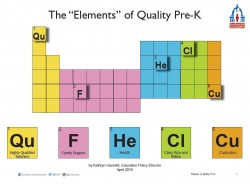
Quality pre-K matters. It matters most to the children who start off with their backpacks full of knowledge — they are familiar with school routines, they understand the importance of using words rather than fists when there is conflict over crayons, and they are beginning to recognize numbers and sound out words. They are Kindergarten-ready.
Quality pre-K also matters to our employers, to our state, and to our teachers. Kindergarten teachers will tell you time and again that they know which kids have had pre-K and which haven’t. They will tell you how much more smoothly class goes when kids in their Kindergarten class attended quality pre-K. Our state benefits tremendously from quality pre-K, with a very conservative estimate telling us that for every $1 Arkansas invests, we reap $7 in return. And, with the problem-solving foundation laid in pre-K, our future workforce is set to think critically and be the next generation of entrepreneurs. Our workforce will be set to
beat the competition.
Why now and why “quality”? Because state support has essentially been static — with only a small, one-time increase in funding in the last eight years — now is the time to really look at what our great program needs today.
The National Institute for Early Education Research (NIEER) has done ground-breaking work in identifying the research-based state-level policies essential for quality.
The quality essentials can be divided into five groups:
1. Highly Qualified Teachers (Qu)
2. Family Support (F)
3. Health (He)
4. Class Size and Student-Teacher Ratios (Cl)
5. Behind the Scenes: Curriculum, Monitoring, and
Administration (Cu)
Altogether the contents of these groups comprise the elements of quality pre-K. How a program is funded and how much funding a program receives is also essential to its quality. In our newest report, The “Elements” of Quality Pre-K, we break down each element, how our program is currently funded, and whether or not an increase is necessary for our Arkansas Better Chance (ABC) program to continue to thrive.
Our starting point for funding is the current cost model for the Arkansas ABC program. All suggested increases are based on feedback from pre-K providers and the level of funding for pre-K expansion sites in Arkansas through the Preschool Development Grants program of the U.S. Department of Education.
Download the full report to learn more about the elements of quality pre-K and what Arkansas’s program needs to continue to thrive and give our children the start they need to succeed.
